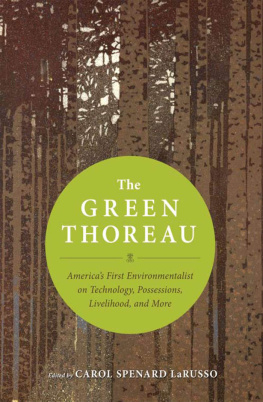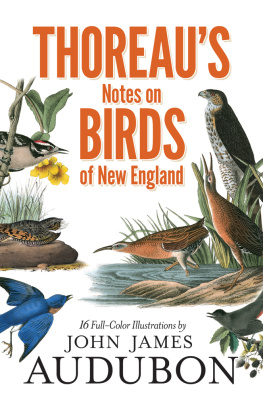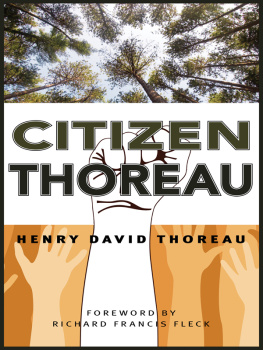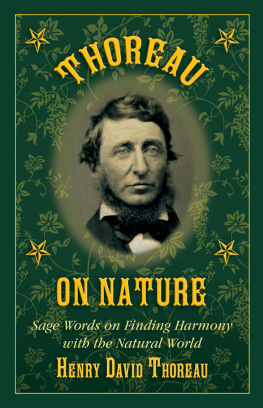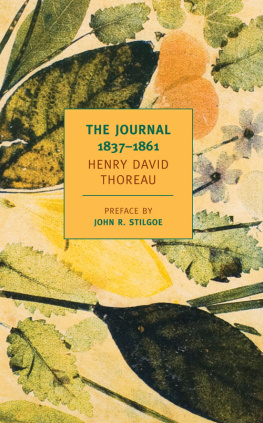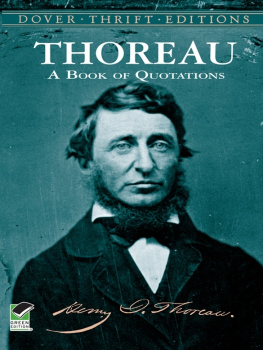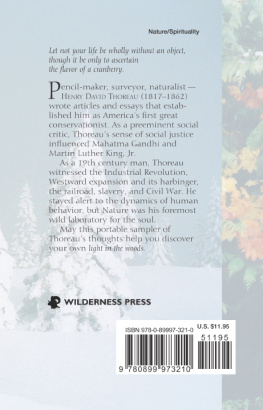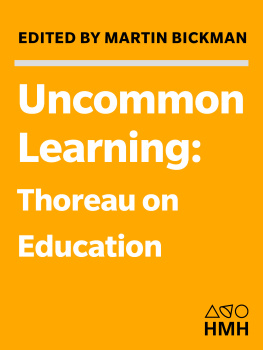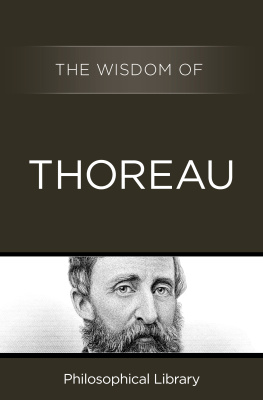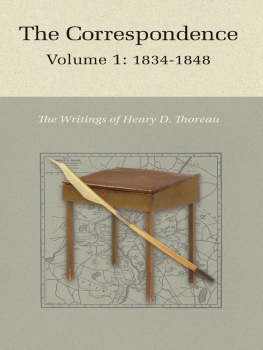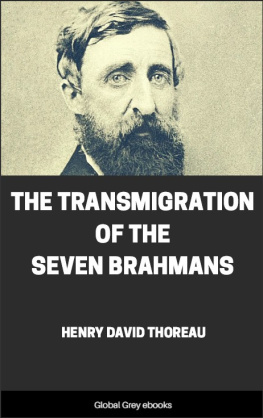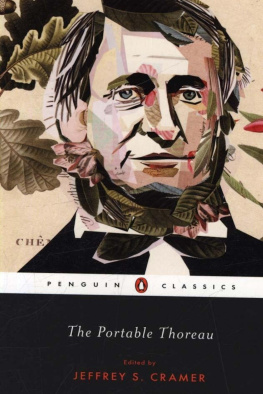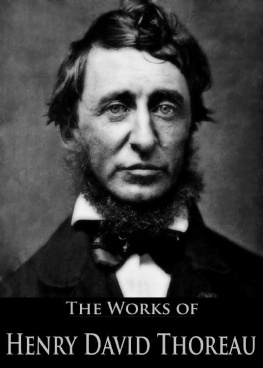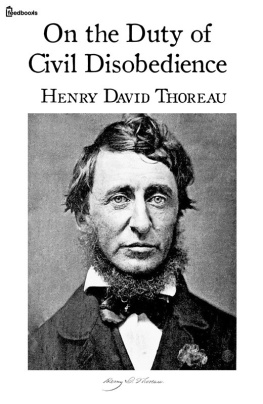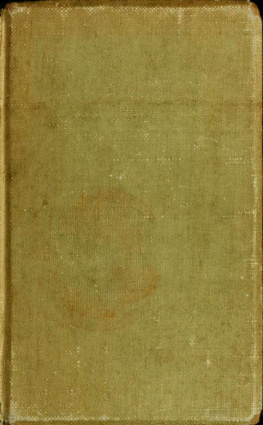
The
GREEN
THOREAU


Copyright 1992, 2012 by Carol LaRusso
All rights reserved. This book may not be reproduced in whole or in part, stored in a retrieval system, or transmitted in any form or by any means electronic, mechanical, or other without written permission from the publisher, except by a reviewer, who may quote brief passages in a review.
Every effort has been made to contact rights holders for material used in The Green Thoreau.
E. B. White quotation on back cover from Henry David Thoreau, Walden, Civil Disobedience, and Other Writings, ed. by William Rossi, 3rd ed. (New York: W. W. Norton & Company, 2008), 443.
Text design by Tona Pearce Myers
Library of Congress Cataloging-in-Publication Data
Thoreau, Henry David, 18171862.
The green Thoreau : Americas first environmentalist on technology, possessions, livelihood, and more / Henry David Thoreau ; selected and with an introduction by Carol Spenard LaRusso. Rev. ed.
p. cm.
Includes bibliographical references.
ISBN 978-1-60868-143-3 (pbk. : acid-free paper)
1. Thoreau, Henry David, 1817-1862Quotations. 2. NatureQuotations, maxims, etc. 3. Conduct of lifeQuotations, maxims, etc. 4. Technology in literature. 5. Nature conservation in literature. I. LaRusso, Carol Spenard, 1935 II. Title.
PS3042.L37 2012
First printing of revised edition, September 2012
ISBN 978-1-60868-143-3
Printed in Canada on 100% postconsumer-waste recycled paper

| New World Library is proud to be a Gold Certified Environmentally Responsible Publisher. Publisher certification awarded by Green Press Initiative. www.greenpressinitiative.org |
10 9 8 7 6 5 4 3 2 1
For my children and grandchildren and all young life on our planet
CONTENTS
Thoreau: A Man for the Twenty-First Century
T he words of Henry David Thoreau (18171862) sound with a deep resonance in the opening decades of the twenty-first century. One hundred and fifty years after his death, the clarity of his vision seems marked especially for our time. Thoreau, with his deep love of the natural world, used nature as his teacher and companion, and as a source of healing, renewal, and inspiration.
Though Thoreaus writings and message were largely ignored during his lifetime and afterward as well, we no longer have the luxury of time in which to be similarly shortsighted. We are among the first generations to experience the effects of exponential population explosion, rampant industrialism, myriad technological inventions, dizzying social-political change, and climatic and environmental damage all of which have dramatically altered our familiar planetary landscape within a few short decades.
Thoreau, probably the first environmentalist (long before that concept was ever formed), divined that in wildness is the preservation of the world. These prophetic words serve as our wake-up call. Only recently weve learned how the systematic destruction of the rain forest has adversely affected the ecosystem of our fragile planet. In the face of many environmental and ethical difficulties we look around us for help. Not only do we need brilliant new technology created, but we also need inspiration, vision, and guidance. In Thoreaus always eloquent and often lyrical prose, we find a nineteenth-century man so amazingly ahead of his time that most of us in the twenty-first century have not yet caught up. He has much to teach us about not only the nurturing of our natural world but also the wise management of all our resources: our time, money, work, talents, health.
Thoreau believed in the freedom and potential of the individual, that each of us makes a difference in influencing our collective human life. Despite the power and proliferation of world governments, we have seen over and over again the incredible power of the individual and of the people of grassroots movements that shape history. One of the most famous was influenced by Thoreaus essay On the Duty of Civil Disobedience, which served as the primer for Gandhis nonviolent resistance campaign in India. The civil rights movement led by Martin Luther King Jr. was similarly influenced. Even the second Russian revolution in the Soviet Union in 1991 demonstrated the concept of passive resistance to an unjust government. Thoreau was not an especially political man but was a man of courage who definitely walked his talk. In 1846 he spent a night in the Concord, Massachusetts, jail for refusing to pay a poll tax to a government that supported slavery and the Mexican War.
But Thoreau, a freedom-loving individualist, would not want us to imitate him. Rather, he demands that we examine how we spend our lives and then work out our own salvation. Thoreau chose to build a cabin on the shores of Walden Pond and live there for over two years, not to escape society or to set an example but to learn his life lessons: I went to the woods because I wished to live deliberately, to front only the essential facts of life, and see if I could not learn what it had to teach. Each of us will learn our life lessons in our own way finding our own personal Walden.
Our path ahead as citizens and custodians of planet Earth may be difficult. It could be that we must downshift and make some sacrifices in order to achieve other, more important goals. Much of what Thoreau says is not what we want to hear. He asks, Shall we always study to obtain more of these things [possessions], and not sometimes be content with less? and reminds us, A man is rich in proportion to the number of things he can afford to let alone. Thoreaus compelling observations serve as catalysts for us to rethink our lives and discover how to live them with more integrity and wisdom. We could wander in the treasure trove of his thought indefinitely.
The Green Thoreau has been prepared as both a practical and an inspirational guide for our way forward in these tumultuous times. I have selected illustrative passages from Thoreaus lesser-known essays and books (some of which were delivered as lectures and published posthumously), as well as from Walden, published in 1854. His artistry, passion, and vision inspire us to reach beyond our years and experience to more wisely face the challenges of this new millennium. Thoreau is there already our best guide and teacher.
A note on the text: We can interpret Thoreaus use of the words man and men to include women as well! Some outdated punctuation has been changed to reflect modern usage; for example, where a dash was preceded by a comma, the comma has been omitted, and obsolete hyphens have been eliminated from such words as to-day and to-morrow. However, no changes have been made that would alter Thoreaus meaning or thought.
Carol Spenard LaRusso
The
Next page
